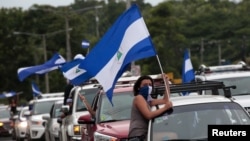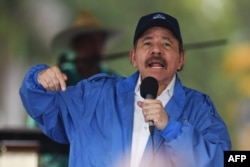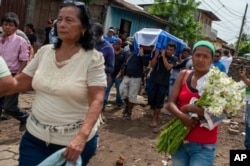Hundreds of Nicaraguans took to the streets of capital Managua on Monday to demand justice for the victims of a violent crackdown on protests against President Daniel Ortega, which claimed another 12 lives over the weekend.
The violence that has plagued the country for three months surged again over the weekend when armed groups and police loyal to Ortega burst into universities occupied by protesters and smashed road blocks set up in defiance of the government.
The attacks deepened local opposition to Ortega, a former Marxist guerrilla leader facing his biggest test in office since he returned to power in 2007.
They have also drawn international condemnation, with Washington saying they were perpetrated by what it called "para-police" against university students, journalists and clergy.
In a statement on Monday, the U.S. State Department called on Ortega's government to heed Nicaraguans' call for democratic reforms immediately and hold elections.
It added that it had imposed U.S. visa restrictions on individuals responsible for human rights abuses or undermining democracy in Nicaragua, as well as their family members.
Around 300 people have died since unrest broke out in April, when Ortega attempted to trim pension benefits. The government later dropped the plan, but its heavy-handed response to the demonstrations sparked a wider protest against Ortega's rule.
Ortega says he is open to dialogue, and has invited the Inter-American Commission on Human Rights (IACHR) to verify his claim that human rights have been respected in the country.
Beyond the protest march called by students, relatives of victims of the violence walked down the main streets of Managua with their coffins, demanding justice for the dead.
"The population hasn't given up because it's still in the streets demanding freedom," said Carlos Tünnermann, a member of the Civic Alliance for Justice and Democracy, one of the main civilian groups leading the opposition to Ortega.
The opposition has called on Ortega to step down and hold early elections to put an end to the turmoil.
The 72-year-old Ortega, whose third consecutive term in office is due to finish in 2021, has gradually tightened his hold on Nicaragua's institutions, alongside his wife and vice president Rosario Murillo.











